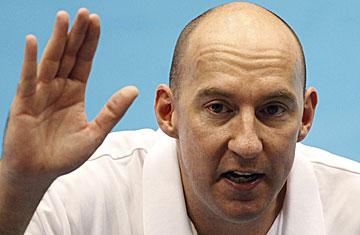
U.S. men's volleyball team head coach Hugh McCutcheon in 2007
For Team USA, Saturday should have marked a golden start to the Beijing Olympics. The sabre sisters, Mariel Zagunis, Sada Jacobson and Becca Ward, swept the board in fencing, the first team in 20 years to claim all three medals in that sport. And Michael Phelps raced off to a phenomenal start, breaking an Olympic record in one of his heats, while the U.S. women's basketball team trounced the Czech Republic by forty points.
But Olympian achievements were overshadowed by the murder of an American visitor. A knife-wielding Chinese man, identified as Tang Yongming, 47, stabbed Todd Bachman, of Lakeville, Minn., his wife Barbara and their female Chinese tour guide on Saturday at a popular tourist spot, the Drum Tower, a Dynasty-era building once used to tell time. The Bachmans are in-laws of U.S. volleyball coach Hugh McCutcheon. Todd Bachman died, while his wife's injuries were described as "serious and life-threatening" by the United States Olympic Committee. Their daughter Elisabeth Bachman McCutcheon, a former Olympic volleyball player, had been with her parents at the time of the attack, but escaped unharmed. "This really puts a damper on the Games," says Joe Smith, team leader for the U.S. boxing squad, while walking in the Olympic Village. The volleyball team was huddling in the village, coping before their Sunday afternoon game against Venezuela.
The murder did not appear to have been pre-meditated. "It seems like a senseless act of violence by a random individual with no motive," says Richard Buangan, spokesperson for the U.S. embassy in Beijing. "They were not targeted because they were Americans." The USOC said the victims had not been wearing any USA apparel. Still, athletes and officials walking around the village were stunned, and even a little afraid. Violence against foreigners is rare in Beijing and across China, but coaches were sounding a warning. "We encourage our athletes to stick together," says Smith. "We'll be reminding of that when we have our team meeting tonight."
Breaux Greer, a U.S. javelin thrower, and shot putter Christian Cantwell heard the news at dinner. "When I first heard about, I just thought it was misinformation," says Cantwell. Greer interjected. "I thought it was just a bad joke. It's freakish news, and it's brutal. It makes me think twice about going downtown." That view was shared by Chloe Sutton, an open-water swimmer: "There's all this security around — how could that happen? It's definitely makes athletes more nervous. I wanted to go to the Silk Market, the Great Wall, the Ming Tombs. Now, I don't know if I'm going to do that."
The story hasn't exactly dominated the local media, whose coverage remains focused on China's Olympic achievements, although it has been reported in the Chinese press. In a city of 15 million people, a random act of violence is unlikely to dominate the headlines, and once the shock has abated, U.S. athletes will likely soon return to exploring Beijing in their downtime. Still, the murder cast an unmistakable damper on the opening day of the Games. "I usually have a smart-ass thing to say about everything," says Greer, one of the more colorful members of the U.S. team (his hair is pink). "Not here, not now. Nothing is funny."
